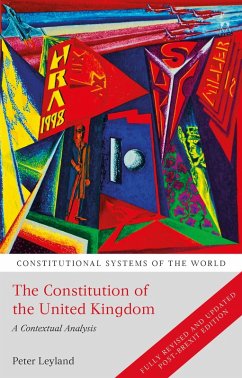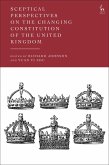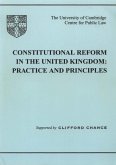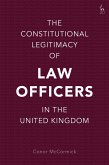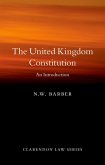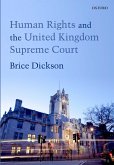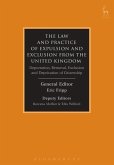19,95 €
19,95 €
inkl. MwSt.
Sofort per Download lieferbar

10 °P sammeln
19,95 €
Als Download kaufen

19,95 €
inkl. MwSt.
Sofort per Download lieferbar

10 °P sammeln
Jetzt verschenken
Alle Infos zum eBook verschenken
19,95 €
inkl. MwSt.
Sofort per Download lieferbar
Alle Infos zum eBook verschenken

10 °P sammeln
- Format: PDF
- Merkliste
- Auf die Merkliste
- Bewerten Bewerten
- Teilen
- Produkt teilen
- Produkterinnerung
- Produkterinnerung

Bitte loggen Sie sich zunächst in Ihr Kundenkonto ein oder registrieren Sie sich bei
bücher.de, um das eBook-Abo tolino select nutzen zu können.
Hier können Sie sich einloggen
Hier können Sie sich einloggen
Sie sind bereits eingeloggt. Klicken Sie auf 2. tolino select Abo, um fortzufahren.

Bitte loggen Sie sich zunächst in Ihr Kundenkonto ein oder registrieren Sie sich bei bücher.de, um das eBook-Abo tolino select nutzen zu können.
Praise for the previous editions
"[A] slim guide to the constitution of the United Kingdom that is both highly readable and impressively thorough. It deserves a place on undergraduate reading lists ... [students] will certainly find it worth their while' Cambridge Law Journal
"[The] written style is admirably clear, conversational and free from jargon ... It will be of immense interest to anybody with a general interest in UK law, politics and history." Times Higher Education
This timely new edition addresses the many constitutional changes that have arisen since 2016 (including…mehr
- Geräte: PC
- mit Kopierschutz
- eBook Hilfe
- Größe: 4.9MB
Andere Kunden interessierten sich auch für
![Sceptical Perspectives on the Changing Constitution of the United Kingdom (eBook, PDF) Sceptical Perspectives on the Changing Constitution of the United Kingdom (eBook, PDF)]() Sceptical Perspectives on the Changing Constitution of the United Kingdom (eBook, PDF)44,95 €
Sceptical Perspectives on the Changing Constitution of the United Kingdom (eBook, PDF)44,95 €![Constitutional Reform in the United Kingdom (eBook, PDF) Constitutional Reform in the United Kingdom (eBook, PDF)]() Constitutional Reform in the United Kingdom (eBook, PDF)79,95 €
Constitutional Reform in the United Kingdom (eBook, PDF)79,95 €![The Constitutional Legitimacy of Law Officers in the United Kingdom (eBook, PDF) The Constitutional Legitimacy of Law Officers in the United Kingdom (eBook, PDF)]() Conor McCormickThe Constitutional Legitimacy of Law Officers in the United Kingdom (eBook, PDF)38,95 €
Conor McCormickThe Constitutional Legitimacy of Law Officers in the United Kingdom (eBook, PDF)38,95 €![The United Kingdom Constitution (eBook, PDF) The United Kingdom Constitution (eBook, PDF)]() N. W. BarberThe United Kingdom Constitution (eBook, PDF)26,95 €
N. W. BarberThe United Kingdom Constitution (eBook, PDF)26,95 €![Human Rights and the United Kingdom Supreme Court (eBook, PDF) Human Rights and the United Kingdom Supreme Court (eBook, PDF)]() Brice DicksonHuman Rights and the United Kingdom Supreme Court (eBook, PDF)60,95 €
Brice DicksonHuman Rights and the United Kingdom Supreme Court (eBook, PDF)60,95 €![The Law and Practice of Expulsion and Exclusion from the United Kingdom (eBook, PDF) The Law and Practice of Expulsion and Exclusion from the United Kingdom (eBook, PDF)]() The Law and Practice of Expulsion and Exclusion from the United Kingdom (eBook, PDF)88,95 €
The Law and Practice of Expulsion and Exclusion from the United Kingdom (eBook, PDF)88,95 €![Regulation-Making in the United Kingdom and Australia (eBook, PDF) Regulation-Making in the United Kingdom and Australia (eBook, PDF)]() Andrew EdgarRegulation-Making in the United Kingdom and Australia (eBook, PDF)79,95 €
Andrew EdgarRegulation-Making in the United Kingdom and Australia (eBook, PDF)79,95 €-
-
-
Praise for the previous editions
"[A] slim guide to the constitution of the United Kingdom that is both highly readable and impressively thorough. It deserves a place on undergraduate reading lists ... [students] will certainly find it worth their while' Cambridge Law Journal
"[The] written style is admirably clear, conversational and free from jargon ... It will be of immense interest to anybody with a general interest in UK law, politics and history." Times Higher Education
This timely new edition addresses the many constitutional changes that have arisen since 2016 (including those brought about by Brexit and the COVID-19 pandemic) whilst retaining its hallmark features of clarity and concision.
Adopting a thematic approach, it discusses questions of history, sources and conventions, the role of the Crown, Parliament and the electoral system, government and the executive, the judiciary, and the territorial distribution of power. In addition, it offers analysis of the evolution of the UK's historic non-codified constitution, its strengths and perceived weaknesses, and of reform initiatives. Engaging with the central issues in play as the UK enters a new chapter, it explores the impact on devolved government, the principle of sovereignty, the role of the courts and parliamentary reform.
As well as providing a contextual and authoritative overview of the principles, doctrines and institutions that underpin the elusive constitution, this study will allow students of law and politics, both from the UK and abroad, to develop an informed view of how it actually works.
"[A] slim guide to the constitution of the United Kingdom that is both highly readable and impressively thorough. It deserves a place on undergraduate reading lists ... [students] will certainly find it worth their while' Cambridge Law Journal
"[The] written style is admirably clear, conversational and free from jargon ... It will be of immense interest to anybody with a general interest in UK law, politics and history." Times Higher Education
This timely new edition addresses the many constitutional changes that have arisen since 2016 (including those brought about by Brexit and the COVID-19 pandemic) whilst retaining its hallmark features of clarity and concision.
Adopting a thematic approach, it discusses questions of history, sources and conventions, the role of the Crown, Parliament and the electoral system, government and the executive, the judiciary, and the territorial distribution of power. In addition, it offers analysis of the evolution of the UK's historic non-codified constitution, its strengths and perceived weaknesses, and of reform initiatives. Engaging with the central issues in play as the UK enters a new chapter, it explores the impact on devolved government, the principle of sovereignty, the role of the courts and parliamentary reform.
As well as providing a contextual and authoritative overview of the principles, doctrines and institutions that underpin the elusive constitution, this study will allow students of law and politics, both from the UK and abroad, to develop an informed view of how it actually works.
Produktdetails
- Produktdetails
- Verlag: Bloomsbury UK eBooks
- Seitenzahl: 384
- Erscheinungstermin: 17. Juni 2021
- Englisch
- ISBN-13: 9781509945566
- Artikelnr.: 62021842
- Verlag: Bloomsbury UK eBooks
- Seitenzahl: 384
- Erscheinungstermin: 17. Juni 2021
- Englisch
- ISBN-13: 9781509945566
- Artikelnr.: 62021842
- Herstellerkennzeichnung Die Herstellerinformationen sind derzeit nicht verfügbar.
Peter Leyland is Professor of Public Law at SOAS, University of London and Emeritus of London Metropolitan University.
1. UK Constitution: Context and History Introduction Constitutional
Contexts What is Liberal Democracy? The UK Constitution, Constitutionalism,
and Good Governance Democracy, Accountability, and the Digital World
Constitutional History Qualifying Absolute Monarchy The Emergence of
Parliament and the Path to Democracy Defining the Nation: What is the
United Kingdom? Empire to Commonwealth The European Union and Brexit
Constitutional Consequences Conclusion Further Reading 2. Sources of the
Constitution Introduction Statute Law The Common Law European Union Law
European Convention on Human Rights Legal Treatises The Law and Customs of
Parliament The Royal Prerogative Conventions as a Constitutional Source
Defining Conventions The Practical Importance of Constitutional Conventions
Conclusion Further Reading 3. Constitutional Principles Introduction
Parliamentary Sovereignty Defining Legal Sovereignty Express Repeal,
Implied Repeal, and Constitutional Statutes Sovereignty, EU Law, and Brexit
2 The Human Rights Act 1998 and Sovereignty The Jackson Case: A Revised
Interpretation of Sovereignty? Political Sovereignty: Elections,
Referendums, and Brexit The Rule of Law and Separation of Powers Defining
Rule of Law The Response to Dicey Separation of Powers Fusion of Powers
Parliament, the Lord Chancellor, and the UK Supreme Court Separation of
Powers and Judicial Independence A Redefinition of Power? Conclusion
Further Reading 4. Constitutional Monarchy Introduction What is the Royal
Prerogative? The Constitutional Role of the Monarchy Does the Monarch
Retain Real Power? What is the 'Crown'? Liability of the Crown in Tort and
Contract Evaluation: Preservation, Reform, or Abolition? Conclusion Further
Reading 5. Parliament Introduction General Elections First Past the Post
Alternatives to First Past the Post Social Media and Electronic Voting The
Formation of the Government Parliament: Composition and Procedure The
Speaker and the Role of Backbench MPs Government and Opposition
Parliamentary Privilege Parliamentary Standards and the Conduct of MPs The
House of Lords Composition of the House of Lords House of Lords: Further
Reform? Parliament as Legislator Public Bills Private Members' Bills and
Private Bills English Votes for English Laws (EVEL) Parliament as Watchdog
Parliamentary Questions Departmental Select Committees Wright Reforms:
Standing Up to the Executive Public Accounts Committee and National Audit
Office Parliamentary Scrutiny of Delegated Legislation and the Impact of
Brexit E-Petitions and Popular Democracy The Parliamentary Ombudsman
Conclusion Further Reading 6. Government and Executive Introduction The
Prime Minister and the Government The Role of Prime Minister The Prime
Ministerial Power and Fixed Term Parliaments The Prime Minister and
Collective Cabinet Responsibility The Prime Minister: Appointments and
Dismissals 10 Downing Street and Policy Formation Prime Minister's Press
Office, SPADS, and Government Spin Shaping Government Departments Ministers
and Civil Service Individual Ministerial Responsibility Government
Accountability and the Scott Report The Role of the Civil Service New
Public Management, Contract State, and Executive Accountability Civil
Service Management and the Recognition of Codes of Practice Government
Openness and the Freedom of Information Act 2000 E-Government Revolution
Conclusion Further Reading 7. The Constitutional Role of the Courts
Introduction The Role of the Courts A Supreme Court for the United Kingdom
Common Law and Statutory Interpretation The Evolution of the Office of Lord
Chancellor Appointing and Dismissing Judges Administrative Law and Judicial
Review Red Light and Green Light Theory Tribunals and the 'Green Light'
View The Impact of Judicial Review Distinguishing Public Law from Private
Law The Requirements of Standing Grounds of Judicial Review The Question of
Merits The Constitutional Protection of Rights and the Human Rights Act
1998 Vertical or Horizontal Effect Proportionality Review Significant Cases
under the Human Rights Act 1998 Reforming the Human Rights Act or replacing
it with a British Bill of Rights? Conclusion Further Reading 8. Devolution
Introduction Historical Backdrop Institutional Features: Scotland and Wales
A New Form of Devolution for Northern Ireland Intergovernmental Relations:
Concordats Legal Sovereignty and the Sewel Convention Devolution and the
Courts The Scottish Referendum and the Consolidation of Devolution Finance
and Tax-raising Devolution and Brexit Devolution and England The West
Lothian Question and Constitutional Reform Conclusion Further Reading 9.
Local Government Introduction Mayors, Cities, Regions The Wider Structure
of Local Government The Financing of Local Government From Compulsory
Competitive Tendering to Best Value Citizen Participation and the Big
Society The Accountability of Local Government Conclusion Further Reading
10. The UK Constitution: The Way Ahead? Introduction Parliament and Civil
Service: Challenges to Core Institutions The Integrity of the UK as a
Nation State Is there a Case for the Introduction of a Codified
Constitution? Conclusion Further Reading
Contexts What is Liberal Democracy? The UK Constitution, Constitutionalism,
and Good Governance Democracy, Accountability, and the Digital World
Constitutional History Qualifying Absolute Monarchy The Emergence of
Parliament and the Path to Democracy Defining the Nation: What is the
United Kingdom? Empire to Commonwealth The European Union and Brexit
Constitutional Consequences Conclusion Further Reading 2. Sources of the
Constitution Introduction Statute Law The Common Law European Union Law
European Convention on Human Rights Legal Treatises The Law and Customs of
Parliament The Royal Prerogative Conventions as a Constitutional Source
Defining Conventions The Practical Importance of Constitutional Conventions
Conclusion Further Reading 3. Constitutional Principles Introduction
Parliamentary Sovereignty Defining Legal Sovereignty Express Repeal,
Implied Repeal, and Constitutional Statutes Sovereignty, EU Law, and Brexit
2 The Human Rights Act 1998 and Sovereignty The Jackson Case: A Revised
Interpretation of Sovereignty? Political Sovereignty: Elections,
Referendums, and Brexit The Rule of Law and Separation of Powers Defining
Rule of Law The Response to Dicey Separation of Powers Fusion of Powers
Parliament, the Lord Chancellor, and the UK Supreme Court Separation of
Powers and Judicial Independence A Redefinition of Power? Conclusion
Further Reading 4. Constitutional Monarchy Introduction What is the Royal
Prerogative? The Constitutional Role of the Monarchy Does the Monarch
Retain Real Power? What is the 'Crown'? Liability of the Crown in Tort and
Contract Evaluation: Preservation, Reform, or Abolition? Conclusion Further
Reading 5. Parliament Introduction General Elections First Past the Post
Alternatives to First Past the Post Social Media and Electronic Voting The
Formation of the Government Parliament: Composition and Procedure The
Speaker and the Role of Backbench MPs Government and Opposition
Parliamentary Privilege Parliamentary Standards and the Conduct of MPs The
House of Lords Composition of the House of Lords House of Lords: Further
Reform? Parliament as Legislator Public Bills Private Members' Bills and
Private Bills English Votes for English Laws (EVEL) Parliament as Watchdog
Parliamentary Questions Departmental Select Committees Wright Reforms:
Standing Up to the Executive Public Accounts Committee and National Audit
Office Parliamentary Scrutiny of Delegated Legislation and the Impact of
Brexit E-Petitions and Popular Democracy The Parliamentary Ombudsman
Conclusion Further Reading 6. Government and Executive Introduction The
Prime Minister and the Government The Role of Prime Minister The Prime
Ministerial Power and Fixed Term Parliaments The Prime Minister and
Collective Cabinet Responsibility The Prime Minister: Appointments and
Dismissals 10 Downing Street and Policy Formation Prime Minister's Press
Office, SPADS, and Government Spin Shaping Government Departments Ministers
and Civil Service Individual Ministerial Responsibility Government
Accountability and the Scott Report The Role of the Civil Service New
Public Management, Contract State, and Executive Accountability Civil
Service Management and the Recognition of Codes of Practice Government
Openness and the Freedom of Information Act 2000 E-Government Revolution
Conclusion Further Reading 7. The Constitutional Role of the Courts
Introduction The Role of the Courts A Supreme Court for the United Kingdom
Common Law and Statutory Interpretation The Evolution of the Office of Lord
Chancellor Appointing and Dismissing Judges Administrative Law and Judicial
Review Red Light and Green Light Theory Tribunals and the 'Green Light'
View The Impact of Judicial Review Distinguishing Public Law from Private
Law The Requirements of Standing Grounds of Judicial Review The Question of
Merits The Constitutional Protection of Rights and the Human Rights Act
1998 Vertical or Horizontal Effect Proportionality Review Significant Cases
under the Human Rights Act 1998 Reforming the Human Rights Act or replacing
it with a British Bill of Rights? Conclusion Further Reading 8. Devolution
Introduction Historical Backdrop Institutional Features: Scotland and Wales
A New Form of Devolution for Northern Ireland Intergovernmental Relations:
Concordats Legal Sovereignty and the Sewel Convention Devolution and the
Courts The Scottish Referendum and the Consolidation of Devolution Finance
and Tax-raising Devolution and Brexit Devolution and England The West
Lothian Question and Constitutional Reform Conclusion Further Reading 9.
Local Government Introduction Mayors, Cities, Regions The Wider Structure
of Local Government The Financing of Local Government From Compulsory
Competitive Tendering to Best Value Citizen Participation and the Big
Society The Accountability of Local Government Conclusion Further Reading
10. The UK Constitution: The Way Ahead? Introduction Parliament and Civil
Service: Challenges to Core Institutions The Integrity of the UK as a
Nation State Is there a Case for the Introduction of a Codified
Constitution? Conclusion Further Reading
1. UK Constitution: Context and History Introduction Constitutional
Contexts What is Liberal Democracy? The UK Constitution, Constitutionalism,
and Good Governance Democracy, Accountability, and the Digital World
Constitutional History Qualifying Absolute Monarchy The Emergence of
Parliament and the Path to Democracy Defining the Nation: What is the
United Kingdom? Empire to Commonwealth The European Union and Brexit
Constitutional Consequences Conclusion Further Reading 2. Sources of the
Constitution Introduction Statute Law The Common Law European Union Law
European Convention on Human Rights Legal Treatises The Law and Customs of
Parliament The Royal Prerogative Conventions as a Constitutional Source
Defining Conventions The Practical Importance of Constitutional Conventions
Conclusion Further Reading 3. Constitutional Principles Introduction
Parliamentary Sovereignty Defining Legal Sovereignty Express Repeal,
Implied Repeal, and Constitutional Statutes Sovereignty, EU Law, and Brexit
2 The Human Rights Act 1998 and Sovereignty The Jackson Case: A Revised
Interpretation of Sovereignty? Political Sovereignty: Elections,
Referendums, and Brexit The Rule of Law and Separation of Powers Defining
Rule of Law The Response to Dicey Separation of Powers Fusion of Powers
Parliament, the Lord Chancellor, and the UK Supreme Court Separation of
Powers and Judicial Independence A Redefinition of Power? Conclusion
Further Reading 4. Constitutional Monarchy Introduction What is the Royal
Prerogative? The Constitutional Role of the Monarchy Does the Monarch
Retain Real Power? What is the 'Crown'? Liability of the Crown in Tort and
Contract Evaluation: Preservation, Reform, or Abolition? Conclusion Further
Reading 5. Parliament Introduction General Elections First Past the Post
Alternatives to First Past the Post Social Media and Electronic Voting The
Formation of the Government Parliament: Composition and Procedure The
Speaker and the Role of Backbench MPs Government and Opposition
Parliamentary Privilege Parliamentary Standards and the Conduct of MPs The
House of Lords Composition of the House of Lords House of Lords: Further
Reform? Parliament as Legislator Public Bills Private Members' Bills and
Private Bills English Votes for English Laws (EVEL) Parliament as Watchdog
Parliamentary Questions Departmental Select Committees Wright Reforms:
Standing Up to the Executive Public Accounts Committee and National Audit
Office Parliamentary Scrutiny of Delegated Legislation and the Impact of
Brexit E-Petitions and Popular Democracy The Parliamentary Ombudsman
Conclusion Further Reading 6. Government and Executive Introduction The
Prime Minister and the Government The Role of Prime Minister The Prime
Ministerial Power and Fixed Term Parliaments The Prime Minister and
Collective Cabinet Responsibility The Prime Minister: Appointments and
Dismissals 10 Downing Street and Policy Formation Prime Minister's Press
Office, SPADS, and Government Spin Shaping Government Departments Ministers
and Civil Service Individual Ministerial Responsibility Government
Accountability and the Scott Report The Role of the Civil Service New
Public Management, Contract State, and Executive Accountability Civil
Service Management and the Recognition of Codes of Practice Government
Openness and the Freedom of Information Act 2000 E-Government Revolution
Conclusion Further Reading 7. The Constitutional Role of the Courts
Introduction The Role of the Courts A Supreme Court for the United Kingdom
Common Law and Statutory Interpretation The Evolution of the Office of Lord
Chancellor Appointing and Dismissing Judges Administrative Law and Judicial
Review Red Light and Green Light Theory Tribunals and the 'Green Light'
View The Impact of Judicial Review Distinguishing Public Law from Private
Law The Requirements of Standing Grounds of Judicial Review The Question of
Merits The Constitutional Protection of Rights and the Human Rights Act
1998 Vertical or Horizontal Effect Proportionality Review Significant Cases
under the Human Rights Act 1998 Reforming the Human Rights Act or replacing
it with a British Bill of Rights? Conclusion Further Reading 8. Devolution
Introduction Historical Backdrop Institutional Features: Scotland and Wales
A New Form of Devolution for Northern Ireland Intergovernmental Relations:
Concordats Legal Sovereignty and the Sewel Convention Devolution and the
Courts The Scottish Referendum and the Consolidation of Devolution Finance
and Tax-raising Devolution and Brexit Devolution and England The West
Lothian Question and Constitutional Reform Conclusion Further Reading 9.
Local Government Introduction Mayors, Cities, Regions The Wider Structure
of Local Government The Financing of Local Government From Compulsory
Competitive Tendering to Best Value Citizen Participation and the Big
Society The Accountability of Local Government Conclusion Further Reading
10. The UK Constitution: The Way Ahead? Introduction Parliament and Civil
Service: Challenges to Core Institutions The Integrity of the UK as a
Nation State Is there a Case for the Introduction of a Codified
Constitution? Conclusion Further Reading
Contexts What is Liberal Democracy? The UK Constitution, Constitutionalism,
and Good Governance Democracy, Accountability, and the Digital World
Constitutional History Qualifying Absolute Monarchy The Emergence of
Parliament and the Path to Democracy Defining the Nation: What is the
United Kingdom? Empire to Commonwealth The European Union and Brexit
Constitutional Consequences Conclusion Further Reading 2. Sources of the
Constitution Introduction Statute Law The Common Law European Union Law
European Convention on Human Rights Legal Treatises The Law and Customs of
Parliament The Royal Prerogative Conventions as a Constitutional Source
Defining Conventions The Practical Importance of Constitutional Conventions
Conclusion Further Reading 3. Constitutional Principles Introduction
Parliamentary Sovereignty Defining Legal Sovereignty Express Repeal,
Implied Repeal, and Constitutional Statutes Sovereignty, EU Law, and Brexit
2 The Human Rights Act 1998 and Sovereignty The Jackson Case: A Revised
Interpretation of Sovereignty? Political Sovereignty: Elections,
Referendums, and Brexit The Rule of Law and Separation of Powers Defining
Rule of Law The Response to Dicey Separation of Powers Fusion of Powers
Parliament, the Lord Chancellor, and the UK Supreme Court Separation of
Powers and Judicial Independence A Redefinition of Power? Conclusion
Further Reading 4. Constitutional Monarchy Introduction What is the Royal
Prerogative? The Constitutional Role of the Monarchy Does the Monarch
Retain Real Power? What is the 'Crown'? Liability of the Crown in Tort and
Contract Evaluation: Preservation, Reform, or Abolition? Conclusion Further
Reading 5. Parliament Introduction General Elections First Past the Post
Alternatives to First Past the Post Social Media and Electronic Voting The
Formation of the Government Parliament: Composition and Procedure The
Speaker and the Role of Backbench MPs Government and Opposition
Parliamentary Privilege Parliamentary Standards and the Conduct of MPs The
House of Lords Composition of the House of Lords House of Lords: Further
Reform? Parliament as Legislator Public Bills Private Members' Bills and
Private Bills English Votes for English Laws (EVEL) Parliament as Watchdog
Parliamentary Questions Departmental Select Committees Wright Reforms:
Standing Up to the Executive Public Accounts Committee and National Audit
Office Parliamentary Scrutiny of Delegated Legislation and the Impact of
Brexit E-Petitions and Popular Democracy The Parliamentary Ombudsman
Conclusion Further Reading 6. Government and Executive Introduction The
Prime Minister and the Government The Role of Prime Minister The Prime
Ministerial Power and Fixed Term Parliaments The Prime Minister and
Collective Cabinet Responsibility The Prime Minister: Appointments and
Dismissals 10 Downing Street and Policy Formation Prime Minister's Press
Office, SPADS, and Government Spin Shaping Government Departments Ministers
and Civil Service Individual Ministerial Responsibility Government
Accountability and the Scott Report The Role of the Civil Service New
Public Management, Contract State, and Executive Accountability Civil
Service Management and the Recognition of Codes of Practice Government
Openness and the Freedom of Information Act 2000 E-Government Revolution
Conclusion Further Reading 7. The Constitutional Role of the Courts
Introduction The Role of the Courts A Supreme Court for the United Kingdom
Common Law and Statutory Interpretation The Evolution of the Office of Lord
Chancellor Appointing and Dismissing Judges Administrative Law and Judicial
Review Red Light and Green Light Theory Tribunals and the 'Green Light'
View The Impact of Judicial Review Distinguishing Public Law from Private
Law The Requirements of Standing Grounds of Judicial Review The Question of
Merits The Constitutional Protection of Rights and the Human Rights Act
1998 Vertical or Horizontal Effect Proportionality Review Significant Cases
under the Human Rights Act 1998 Reforming the Human Rights Act or replacing
it with a British Bill of Rights? Conclusion Further Reading 8. Devolution
Introduction Historical Backdrop Institutional Features: Scotland and Wales
A New Form of Devolution for Northern Ireland Intergovernmental Relations:
Concordats Legal Sovereignty and the Sewel Convention Devolution and the
Courts The Scottish Referendum and the Consolidation of Devolution Finance
and Tax-raising Devolution and Brexit Devolution and England The West
Lothian Question and Constitutional Reform Conclusion Further Reading 9.
Local Government Introduction Mayors, Cities, Regions The Wider Structure
of Local Government The Financing of Local Government From Compulsory
Competitive Tendering to Best Value Citizen Participation and the Big
Society The Accountability of Local Government Conclusion Further Reading
10. The UK Constitution: The Way Ahead? Introduction Parliament and Civil
Service: Challenges to Core Institutions The Integrity of the UK as a
Nation State Is there a Case for the Introduction of a Codified
Constitution? Conclusion Further Reading
